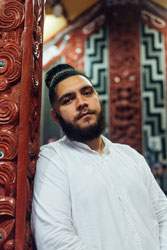Never fade away: Māoritanga in the city

Two of our super talented (ex WHS) Visual Arts students featured in this article: Jacob McGregor (pictured) and Ming (Tibet) Ranginui.
PHOTO courtesy of Chev Hassett.
Never fade away: Māoritanga in the city
From The Wireless, Tuesday 9 May 2017 edition.
Staying connected.
The concrete environment of the city been sculpting Māori identity since the urban drift began early last century. Back in 1936, 83 percent of Māori lived in rural communities, but 50 years later that statistic had flipped - 83 percent were living in cities.
And that drift is still happening today.
We spoke to nine young Māori who left homes where tikanga was part of everyday life and moved to Wellington. They share how they hold on to their māoritanga.
Two of them are our super talented (former WHS) Visual Arts students who are featured in this article: Jacob McGregor and Ming (Tibet) Ranginui.
Re: Jacob McGregor
Hey, tell me about yourself?
Kia ora my name is Jacob McGregor and I’m Ngāti Raukawa ki te tonga, Ngā Rauru, Te Whanau-a-Apanui and I grew up in Whanganui.
Awesome. So, you’re from Whanganui. What is it like growing up there?
It was real cool, I loved growing up on the river and it is very different to Wellington.
Whanganui is quite rural, it’s very conservative but I loved growing up there because it was very quiet and peaceful. It was also close to dad’s and mum’s family so I could always connect to my roots. Ngā Raura is basically Whanganui, but just on half of it in the north.
After growing up in a place like that, how did you find Wellington?
It was really different and just so many people. Very fast paced in comparison to Whanganui, very liberal and open, also it is very carefree here. People are carefree back home but it is just a different type of carefree.
There is a certain stereotype or status people follow (in Whanganui) and so moving down here was cool, but there is less brown people and more snobby people too. The lack of Māori down here was noticeable too.
Not seeing any brown faces in the city how did that make you feel?
I felt like I stood out a bit even though I don’t, because it’s Wellington. I just did not feel homely. It was a bit hard at first not having this immediate connection and even when I came to university the Māori here were awesome but they came from different backgrounds from what I was used to, when I was used to Māori from the Whanganui to Taranaki region.
Last thing, since you’ve been living here how do you personally keep connected to your māoritanga?
The marae is the main thing which keeps me connected, so the marae is just an awesome place to come. It has all these beautiful carvings and pou that are representatives of each iwi in New Zealand and it keeps us all connected.
As well as just being able to continue learning my reo and performing kapa haka, also serving and being amongst all the Māori initiatives where the marae is the centre for that. If I did not have this marae I would be quite estranged and separate from my māoritanga down here in Wellington.
Re: Ming (Tibet) Ranginui
So tell me about yourself Ming.
Kia ora, I’m Tibet but I didn’t have a name for a week when I was born and so my mum called me Ming but my dad named me Tibet because he wanted me to have the qualities of a Tibetan monk. I’m from Atihaunui-a-Paparangi and when I am up the river I feel like I belong there and it's home.
How do you feel about your river now after what has gone on because I know it is special to your iwi?
It is really special. It should have been like this forever and reading the comments that were on Facebook there are so many ignorant people, it makes me upset.
What is it like being an urban Māori?
The primary schools I went to were predominantly white and I could count the number of Māori on my hand. You could tell how you were different and you tried to fit in with them. And you’d try distance yourself from your culture.
Then going to high school there were more Māori and then I did not feel Māori enough, like where am I?
What do you think makes you Māori?
I think you’re either Māori or you’re not. You can’t just be like you’re a little bit, you’re just Māori.
-Ranginui-ex.jpg)
